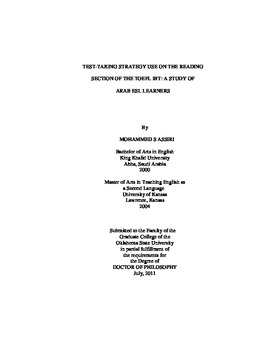| dc.contributor.advisor | Halleck, Gene | |
| dc.contributor.author | Assiri, Mohammed S. | |
| dc.date.accessioned | 2013-11-26T08:29:28Z | |
| dc.date.available | 2013-11-26T08:29:28Z | |
| dc.date.issued | 2011-07 | |
| dc.identifier.uri | https://hdl.handle.net/11244/7051 | |
| dc.description.abstract | Scope and Method of the Study: With the focus on how a sample of 25 Arab ESL learners respond to the TOEFL-iBT reading tasks, this study aimed to find out what strategies respondents tend to use, investigate if there are differences between high- and low-scorers in strategy use, and determine aspects of effective strategy use among respondents. | |
| dc.description.abstract | Data were collected using a procedural integration of stimulated recall, self-observation, and retrospective interview (SRSORI). A pilot study was conducted to evaluate and refine materials and procedures. Data collection was carried out over three stages. First, each participant was oriented to SRSORI and trained in producing verbal reports. Second, the participant responded to two reading sets, and thus was engaged in two SRSORI sessions. And third, the participant was debriefed about his test performance and scores. Data were then transcribed, and results of item analyses were used to decide on episodes for coding. A coding scheme was constructed for each task item by means of inductive coding. Data analysis made use of frequencies to identify patterns of strategy use and qualitative accounts to describe strategy use in relation to such factors as item format, scoring level, and answer correctness. | |
| dc.description.abstract | Findings and Conclusions: Major findings were as follows. Test takers used strategies depending on item format and difficulty in ways that allowed them to achieve different goals, adapt strategies to various task items, and apply strategies using several textual and technical means. High test performance and scoring were characterized by superior skills of both comprehension and test-management as well as high levels of strategic awareness and monitoring. Conversely, low test performance and scoring were associated with poor skills of comprehension and excessive use of test-wiseness. And, test takers sequenced strategies such that certain strategies derived from other strategies, endorsed or facilitated functions of other strategies, or acted in sync with other strategies. | |
| dc.description.abstract | It was concluded that strategy use has three facets: purposeful, multi-form, and resourceful. High test performance and scoring on reading tasks draw on response behaviors and strategies that differ from those associated with low performance and scoring. And, aspects of effective strategy use occur in tandem with logical sequences of strategies. | |
| dc.format | application/pdf | |
| dc.language | en_US | |
| dc.rights | Copyright is held by the author who has granted the Oklahoma State University Library the non-exclusive right to share this material in its institutional repository. Contact Digital Library Services at lib-dls@okstate.edu or 405-744-9161 for the permission policy on the use, reproduction or distribution of this material. | |
| dc.title | Test-taking strategy use on the reading section of the TOEFL-iBT: A study of Arab ESL learners | |
| dc.contributor.committeeMember | Sheorey, Ravi | |
| dc.contributor.committeeMember | Garzon, Susan | |
| dc.contributor.committeeMember | Olson, Nadine | |
| osu.filename | Assiri_okstate_0664D_11479.pdf | |
| osu.accesstype | Open Access | |
| dc.type.genre | Dissertation | |
| dc.type.material | Text | |
| dc.subject.keywords | reading proficiency | |
| dc.subject.keywords | test format | |
| dc.subject.keywords | test-management /-wiseness | |
| dc.subject.keywords | test of reading comprehension | |
| dc.subject.keywords | test-taking strategi | |
| thesis.degree.discipline | English | |
| thesis.degree.grantor | Oklahoma State University | |
